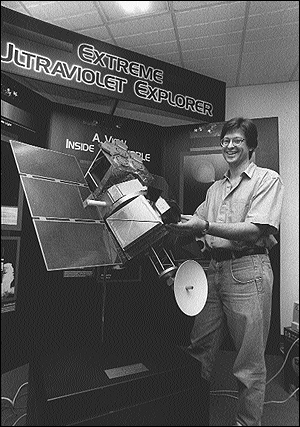
|
|
|
|
|
|
|
|
|
|
|
|
Picture: Rider in the Storm
 Peg Skorpinski photo The spectacular Leonids meteor shower expected Nov. 17 and 18 is good news for stargazers, but a worrisome prospect for Brett Stroozas, project manager for the campus-operated Extreme Ultraviolet Explorer satellite mission. The EUVE team plans to do some fancy repositioning to protect the satellite's main telescope and data transmitter antenna system from a potential pummeling. The Leonid meteor stream originates from Comet 55P/Tempel-Tuttle. In this year's shower -- the most intense in decades -- thousands of shooting stars may flash overhead every minute. Leonid meteors travel at about 45 miles per second (as compared to 12 miles per second for typical meteors), increasing the risk of damage to near-Earth orbiting spacecraft like EUVE. Lawrence Hall of Science plans to offer information on meteors and guidelines on the best types of places to view the Leonids at its stargazing session Saturday, Nov. 10. The stargazing happens weekly, weather permitting, on the lawn below the museum. LHS has also created a direct link to a web site devoted to the Leonid meteor storm. See the LHS Hotlinks page at www.lhs.berkeley.edu/HotLinks.html.
.
|
|
|
This site is produced and maintained by
the Office of Public Affairs, University of California,
Berkeley. |